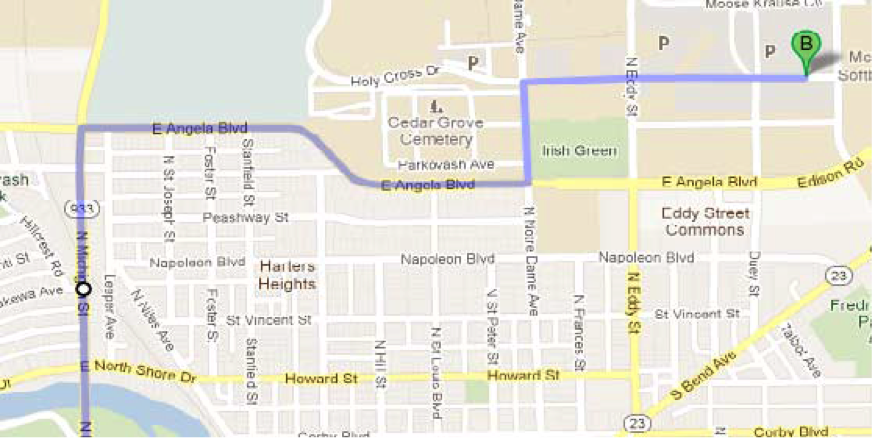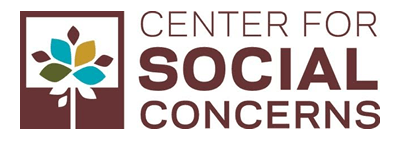Power of the People: Uplifting Global Communities
Within the myriad of disparities dispersed throughout our globe, among them is the notion that certain communities are inherently less capable of being agents in progress. This year's HDC theme, Power of the People: Uplifting Global Communities, seeks to highlight the importance of localization and ownership agendas within the development sphere. Bountiful agency has always existed within all communities. Our theme emphasizes the idea of practitioners and researchers working to collaborate with communities as opposed to working for communities. It is our strong belief that development goals can be achieved with better success if we engage the power that exists in all people around the globe.
|
|
Keynote Speaker
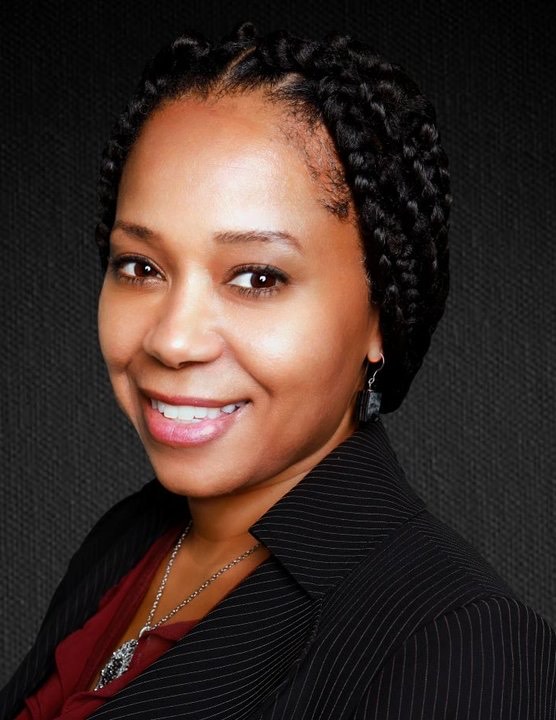 Dr. Mikhiela Sherrod is the Director of US Domestic Programs at Oxfam America. She has over 17 years of experience leading non-profit organizations and working as a community organizer with Black farmers and rural communities of color in the U.S. and developing countries. As the lead coordinator and director of the Southwest Georgia Project for Community Education, Inc., Dr. Sherrod worked with rural communities and coalitions to build capacity and infrastructure to achieve social and economic justice in the local food system and led an organizational revitalization that build capacity to sustain the work. As the executive director of Agricultural Missions, Inc., an ecumenical non-profit organization, she successfully led a decades-long development and capacity restoration project in Liberia and Sierra Leone that resulted in the formation of an association of cooperatives engaged in regenerative agricultural practices and adaptation and mitigation strategies to address climate change.
Dr. Mikhiela Sherrod is the Director of US Domestic Programs at Oxfam America. She has over 17 years of experience leading non-profit organizations and working as a community organizer with Black farmers and rural communities of color in the U.S. and developing countries. As the lead coordinator and director of the Southwest Georgia Project for Community Education, Inc., Dr. Sherrod worked with rural communities and coalitions to build capacity and infrastructure to achieve social and economic justice in the local food system and led an organizational revitalization that build capacity to sustain the work. As the executive director of Agricultural Missions, Inc., an ecumenical non-profit organization, she successfully led a decades-long development and capacity restoration project in Liberia and Sierra Leone that resulted in the formation of an association of cooperatives engaged in regenerative agricultural practices and adaptation and mitigation strategies to address climate change.
Dr. Sherrod has over 10 years of experience leading research and evaluation projects for non-profit and philanthropic organizations, including incorporating and using a racial equity lens to assess work priorities and integrate equitable practices and strategies. She has an undergraduate degree in Mechanical Engineering from Tuskegee University, a PhD in Genetics from the University of Iowa, and completed the first year of an MPH in Epidemiology from Rutgers University.
Session 1: Saturday, Feb. 24th 10:00 am - 11:30 am
Panel A: The Power of Educators - Figures that Impact Education Growth
- Fabrice Uwihirwe School General Assembly Committees And School Dropout in Rwanda: Bright Spot Schools in the Rutsiro District
- Oluwatoni Akintola School Management & Re-Enrolling Dropouts: Experimental Evidence from Schools in Rural Uganda
- Peter Cohen Exploring the Role Life Orientation Plays in Preparing South African Learners For Life After Matric: A Case Study in Cato Manor
- Giancarlo Cappelli Wang Between Innovation and Crisis: How Ceará Has Redefined Comprehensive Education Policy Amidst the COVID-19 Pandemic
Panel B: The Power of Mothers - Maternal Health Experiences
- *Ashleigh Cotter Maternal Migration: Analyzing the Effects of Migrant Status on the Maternal Health Experiences of Migrant Women in Monterrey, Mexico
- Grace Clinton Postpartum Care Practices and Education of Young Mothers in the Kgalagadi District of Botswana
- Jillian Brunner Investigating the Effects of Adolescent Pregnancy on Maternal Health and Child Development Among At-Risk Patients in Bolivia
Panel C: The Power of Women - Female Empowerment in Organizations
- Jack Drey From Stress to Success: Analyzing the Role of Mentorship in Overcoming Barriers to Girls’ Education in Kisumu, Kenya
- Lucy Wesson Peace and Empowerment in Historical and Modern Women’s Co-operatives: A Comparative Case Study
- Cora Beeson The Unacknowledged and Underfunded Fight for Women’s Empowerment in Indonesia
Panel D: The Power of Identity - Collective Belonging of Groups
- Finn Meachem Sunan Kalijaga: The Birth of a Self-Actualized Pilgrimage Culture***
- Simone Watson (Spanish) The Formation of the AfroChilean Identity and its Manifestation in the Political Movements of the Country
- Lauren Carter Belonging and Identity in Mustang: Lived Experiences, Social Identities, and Mobility Patterns among Himalayan Peoples of Nepal***
Session 2: Saturday, Feb. 24th 11:45 am - 1:15 pm
Panel A: The Power of Schools - Culture and Engagement within Education
- Jessica Ashman Exploring the role of Cultural Capital in Education in the Dominican Republic
- Hallee Limes Māmānuina o Aoga Amata Contextualizing the Pedagogy of Samoan Identity in Early Learning Education
- Sally Fales An Exploratory Study into Empowering Grade 10 and 11 Learners Through Critical Engagement With South African Literature: A Case Study in Cato Manor
Panel B: The Power of Women - Identity and Empowerment of Women in Communities
- Samantha Murphy Life as an Ex-Sex Worker: Is it possible to stay out of Ho Chi Minh City’s sex industry?
- Lena Kennell Female Same-Sex Relationships: Qualitative Analysis of Resilience and Gendered Stigmatization in Samoa
- Bupe Lughano Kabaghe Women's Representation in the Zambian National Assembly
Panel C: The Power of the Mind - Effects of Mental Health and Stigmatization
- Azuna Sawada Predictors of higher stigmatizing attitudes towards people with mental health problems..***
- Daniel Mooney Psychological Intervention in the Informal Settlements of Cape Town, South Africa.
- Isabel Powell The Effects of Stigma Against HIV and Tuberculosis on Patient Mental Health and Healthcare-Seeking Behavior in Dharamshala, India
Panel D: The Power of Environment - Working with the World Around Us
- Anna Mittag Farmer–herder conflicts in sub-Saharan Africa: drivers, impacts, and strategies for resolution
- Kerry Conneely The Impact of Climate-Accelerated Flooding, Sanitation Infrastructure, and Solid Waste Management on Personal Well-being in Coastal Communities in Ghana
- Robert Fitzpatrick Sustainable Agriculture as Inclusive Advancement in Costa Rica
- Samantha Wheelis Examining the Relationship Between the Environment and Traditional Samoan Fishing Knowledge Through the Lens of Sustainability
Session 3: Saturday, Feb. 24th 2:30 pm - 4:00 pm
Panel A: The Power of Community - Social Economics of Moving People and Capital
- Alessandra Rosa Policarpo Can the Global South Improve the Humanitarian Aid System? Comparing North-South Aid and South-South Cooperation in Haiti***
- Damien Chang The 21st Century Hawaiian Renaissance: Rethinking Tourism through Self-Sufficient Communities***
- Laiqa Walli Tracing the Spatial and Industry Distribution of the ‘Brain Drain’ Effect on Tanzanian Youth
Panel B: The Power of Health - Improvements to Healthcare Systems
- *Lillie Kang Public Trust and Cultural Conservation: A Health and General Needs keerAssessment of the Chepang Community in Makwanpur District, Raksirang Rural Municipality, Nepal***
- Manvit Adusumilli Evaluating Interventions Aimed at Improving the Emotional Well-Being of Community Health Workers in Chiapas, Mexico
-
Sezin Sakmar What Makes a Family: How an Empowerment-Based Health Care Delivery Model Employs Family Planning to Positively Impact Families in Rural Maharashtra, India
Panel C: The Power of Ending Violence - Impacts of Gender Based Violence and Reporting Systems
- Adriana Abdinader Evaluating the Effectiveness and Perception of the Red Naranja Mobile Application
- Amelia Opsahl The social, economic, and political barriers that female victims of domestic violence face when reporting violence or accessing the corresponding protection services in Maipú, Mendoza ***
- Lena Shadow Searching for Legitimacy: An Analysis of the Role South African Civil Society Has Taken to Improve Gender-based Violence Survivor’s Reporting and Help-Seeking Behaviors in Contexts with Limited Procedural Justice or Police Legitimacy
Panel D: The Power of Migration - Understanding Migrants and their Communities
- Audrey Feldman Friends with Benefits: the role of social networks in safety net take-up among refugees
- Daisy Alcantar (Spanish) Existing and Surviving: The Institutional Prejudice that Venezuelan Immigrants Face in Chile's Fifth Region
- Esther Ekeh Therapy Approaches Provided to Traumatized Refugee Children***
- Keerthana Krishnan A Comparative Study of Migrant Mental Health in Switzerland and the United States: How Do Different Healthcare Systems Affect Access to Care?
*Bartell Prize Recipients
*** Indicates Virtual Presentation
HDC Team
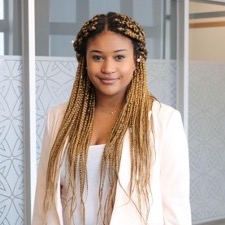
Jessica Ashman, Conference Co-chair
Jessica is a senior at the University of Notre Dame, studying Anthropology and Global Affairs with a concentration in International Development and a minor in Latino Studies. Jessica is passionate about topics having to do with sociocultural identity and its intersections with human development. She strongly believes in the power of social science research to generate informed solutions to complex problems. Jessica’s independent fieldwork took place in the Dominican Republic where she examined concepts of colorism, anti-Haitianism, national identity, and education. Over a two month period, she worked with two development NGOs to conduct interviews with Dominican and Haitian young adults. Currently, she works with Dr. Luis Felipe R. Murillo who conducts research on open technologies in Afro-descendent Brazilian populations. After graduation, Jessica plans to pursue her PhD in Socio-cultural Anthropology so she can continue her lifelong exploration of transnational blackness and the barriers to social inclusion. In her freetime, Jessica likes to sing, spend time with friends, and learn about other cultures.
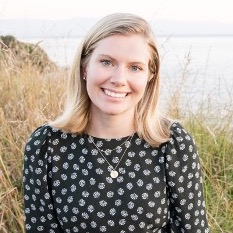
Grace Clinton, Conference Co-chair
Grace is a senior at the University of Notre Dame studying Pre-Professional Studies, Global Affairs, and Anthropology with a concentration in International Development Studies. Her passion and work surround the furtherance of female health and rights on a global scale. For the past three years she has done research with Dr. Joyce Adams on postpartum maternal health in various parts of Ghana. Her independent research projects work on issues of teen pregnancy rural districts of Botswana. Grace also works for the Harvard School of Global Surgery and Social Change to help with research and development of international maternal surgical care access and legislation. After graduating in 2024, she plans on attending graduate school for Medical Anthropology with a focus on female and maternal health rights for displaced persons throughout sub-Saharan Africa. In her free time, Grace likes to run, cook, and travel often. She has been a part of the Human Development Conference team since her first-year on campus and is very excited to be a co-chair this year!
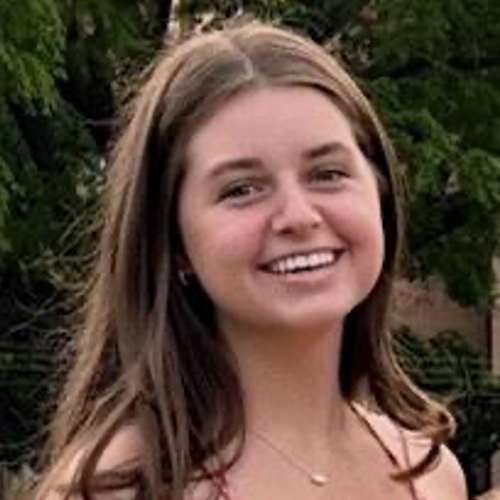
Carolyn Hoagland, Marketing
Carolyn is a freshman at Notre Dame living in Welsh Family Hall. She is a Global Affairs major with an interest in poverty alleviation and international law. As a military child, she has lived all over the world but currently calls Washington, D.C. her home. On campus, she volunteers as a tutor and student ambassador in undergraduate admissions. Carolyn is very excited to be involved with HDC this year!
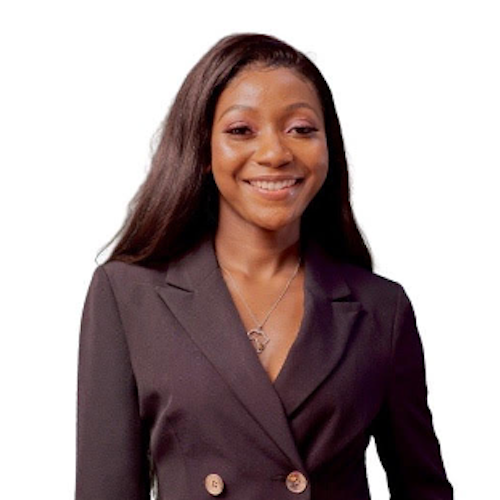
Lugano Kabaghe, Marketing
Lughano is a senior studying Political Science and Global Affairs with a concentration in International Development Studies. She is passionate about gender equality, governance and international development. Currently, she is researching women's representation and participation in the Zambian National Assembly for her senior thesis and capstone. In the last three years, Lughano has worked on various research and international development projects in Kenya, Zambia, South Africa and Mali. The main themes of her work are youth empowerment, gender equality, civil engagement, elections and African politics. This past summer, she spent her time conducting interviews with elected women MPs and politicians and conducting archival research in Lusaka, Zambia. Kabaghe also attended the Women’s Deliver conference in Rwanda where she engaged with high-level women political leaders and activists. This coming December, she will be presenting her research findings as part of a panel on Governance in Africa: Contemporary and Historical Trends at the African Studies Association conference in San Francisco. In her free time Lughano loves to travel, cook, make jewelry and enjoys planning events.
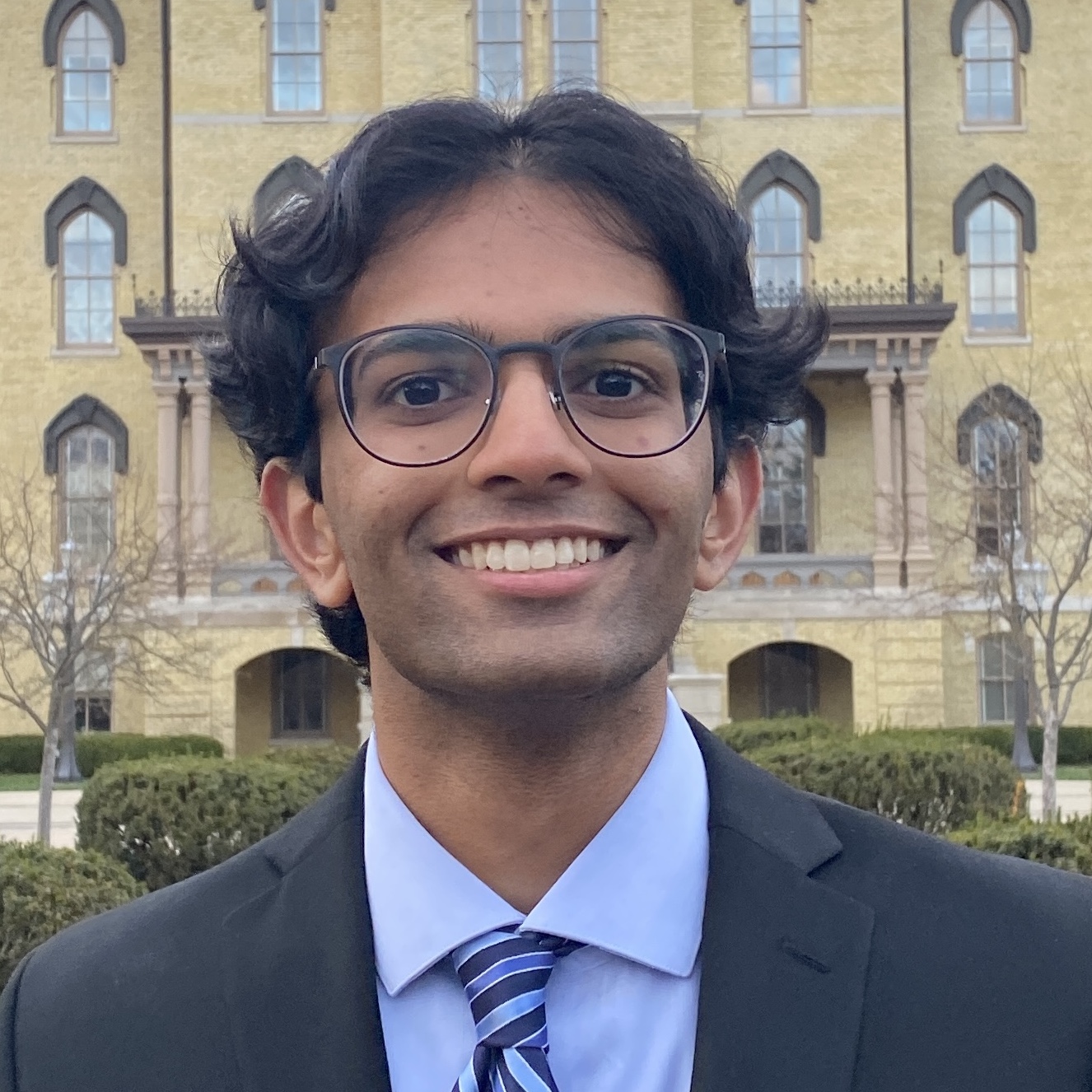
Manvit Adusumilli, Abstracts
Manvit is a senior at Notre Dame from Darien, IL. He is studying Neuroscience & Behavior and Global Affairs with a minor in Poverty Studies. This past summer, Manvit spent eight weeks conducting independent research on community health workers and mental health with Partners in Health in Chiapas, Mexico. At school, Manvit enjoys volunteering with local organizations in South Bend and learning about global health and social justice. In the future, Manvit hopes to pursue medical school. He is excited to be a member of the HDC Committee this year to learn about the amazing research conducted by students around the world.
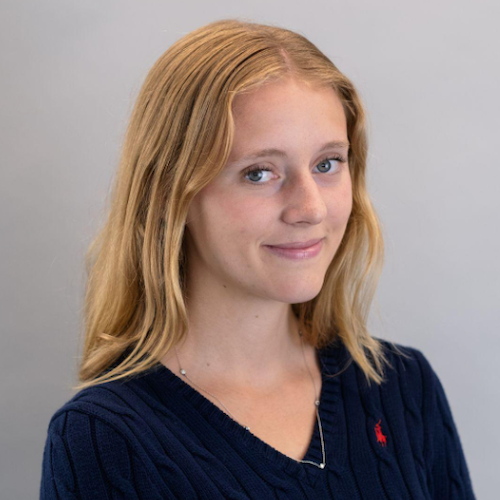
Elizabeth Coleman, Abstracts
Elizabeth is a first year student from Annapolis, Maryland studying Global Affairs and living in Lewis Hall. She is a member of Notre Dame’s Committee on the Constitution and the Student Policy Network. She is passionate about languages, female empowerment, and human rights and hopes to go to law school in the future.
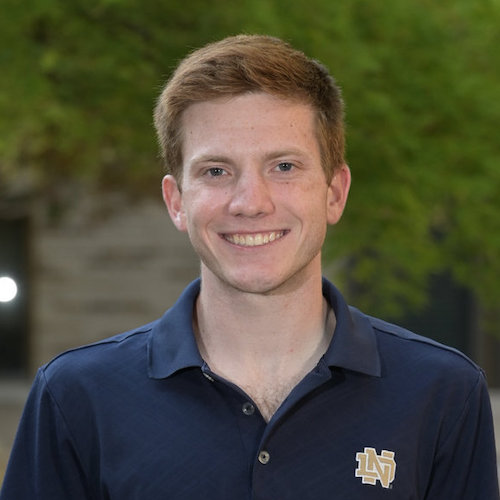
Jack Drey, Abstracts
Jack is a senior at the University of Notre Dame studying Biological Sciences with minors in International Development Studies and Classical Studies Greek and Roman Civilization. Jack is passionate about global health and education and how they can contribute to international development. He currently works with Professor Mark Golitko studying long-term human response to environmental change in northern Papua New Guinea, and in the Blagg Lab, which is part of the Warren Center for Drug Discovery at the University of Notre Dame. Jack’s independent research project took place in Kisumu, Kenya, where he worked with the Rusalia Resource Foundation to study barriers and drivers of girls’ academic success in rural Kenya, and how mentorship can provide effective support to these students. After graduating in 2024, Jack plans to take a gap year before attending medical school. In his freetime, Jack loves to play tennis, read, and travel.
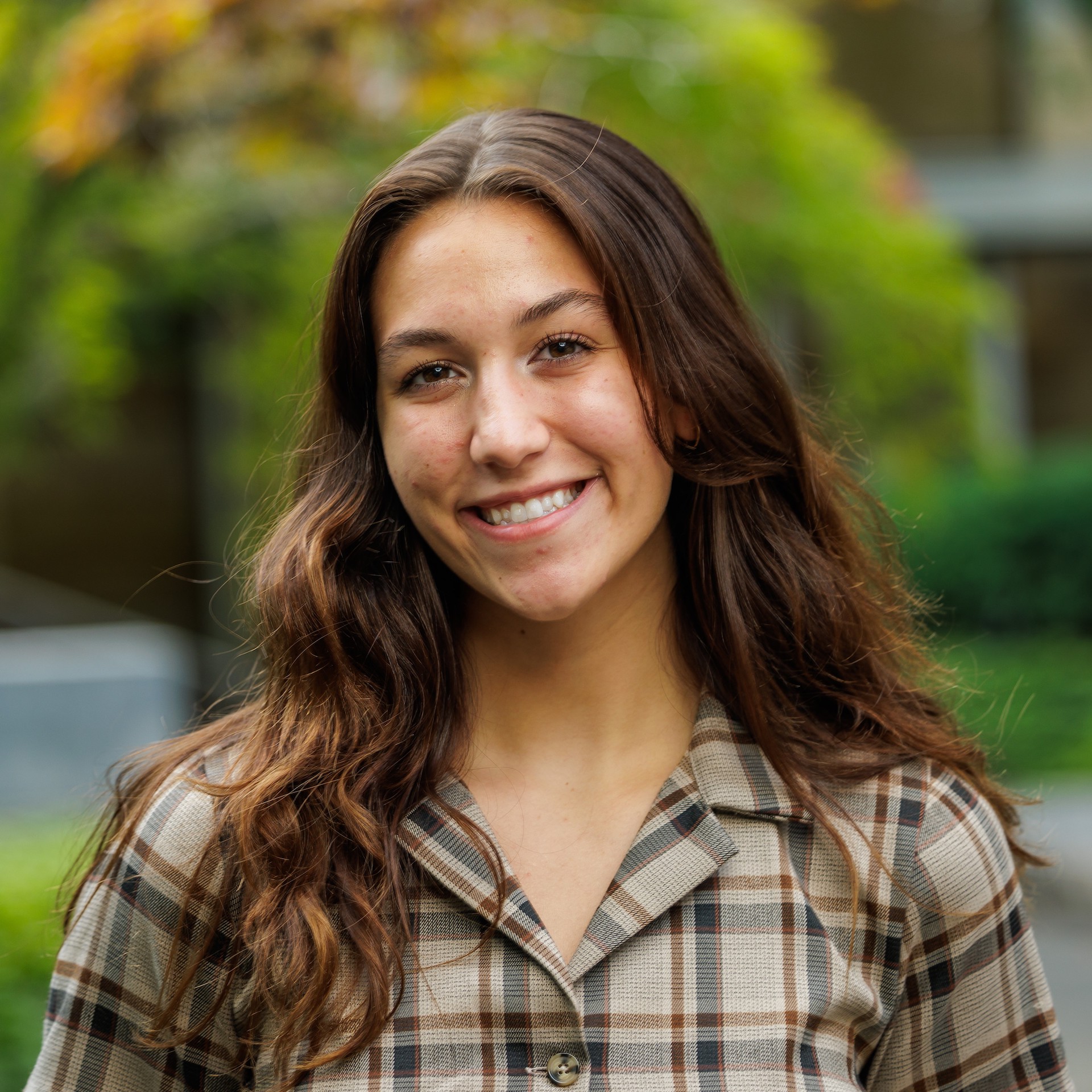
Tavin Martin, Abstracts
Tavin is a junior from Evansville, Indiana studying global affairs, Latino studies, and ESS. Martin is currently working as a research assistant for Professor Jaimie Bleck in the political science department to study how youth community discussion groups in urban areas can encourage civic engagement and political participation. At the moment, Martin is assisting Professor Bleck by aiding in the process of completing a book that investigates the importance and future of "Grinw", local discussion groups for young men, in Malian society as a means to strengthen civil society and youth roles within it. After the book is finalized, Martin plans to assist Professor Bleck by aiding in a collaborative research project with UC Berkely that is investigating the use of language and activism in four African countries (Nigeria, Cote d'Ivoire, Zambia, and Mali) that have experienced a series of or sustained government instability.
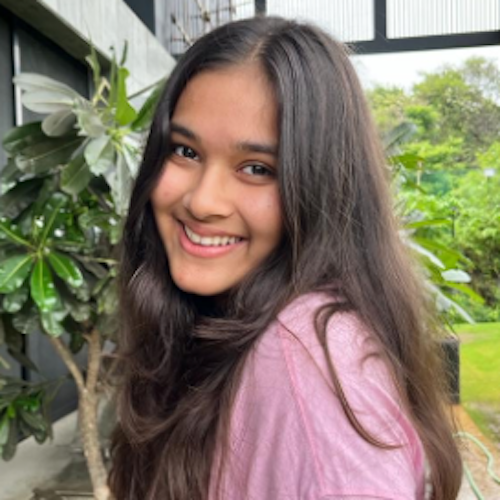
Tia Mittle, Abstracts
Tia is a sophomore from Mumbai, India, majoring in Global Affairs and Political Science, and minoring in International Development Studies at the University of Notre Dame. As a Kellogg International Scholar, Tia is conducting research with Professor Susan Ostermann on the colonial legacies of Hale’s doctrine (focused on marital rape) in India and the US. On campus, Tia serves as a God and the Good Life Fellow, the President of FeministND, the Diversity Commissioner and Service Commissioner for Lewis Hall, and was a Diplomacy Scholar at the Nanovic Institute for European Studies last Spring. Tia will be spending her Spring ’24 semester in Washington DC, interning and studying in the capital. In her free time, she likes to travel, go on lake walks, visit cafés, and spend time with her friends & family. Tia is interested in learning about global development and is excited to align her passion with the HDC this year!
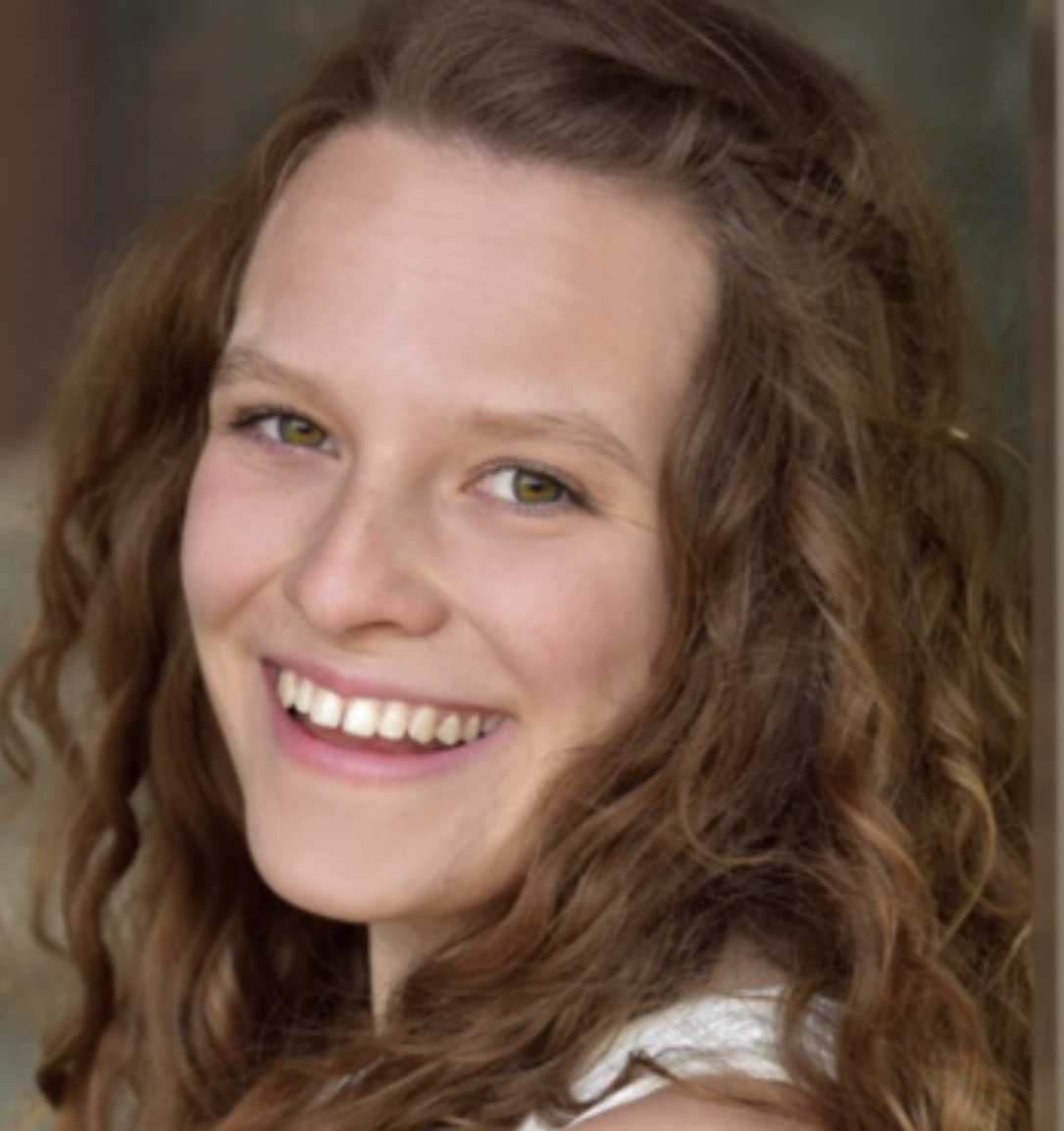
Emma Ryan, Abstracts
Emma is a Senior studying Political Science and Global Affairs from the St. Louis metro area. She is passionate about advocacy work and co-lead a student effort to pass legislation to help immigrants in Indiana. She enjoys travel, having studied abroad in Chile and India and returning to Chile to teach in a youth organization. She is interested in interdisciplinary topics like education and human development, and it currently writing her senior thesis on transformational education involving psychology, social sciences and education. She plans to explore these topics further after graduation before graduate school.
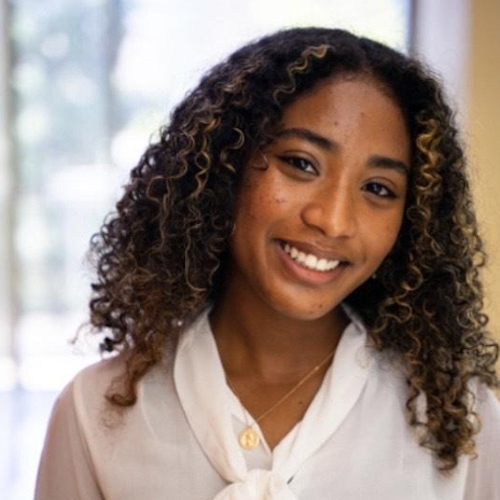
Veronica Bofah, Logistics
Veronica is a first-year at the University of Notre Dame, studying Global Affairs and Spanish. She has always been interested in all matters of social justice, however, she is particularly passionate about grassroots organizing and its effects on solving global issues. Given her experience with social justice organizing, Veronica is eager to learn more through the Human Development Conference, and help bring this wonderful event to life!
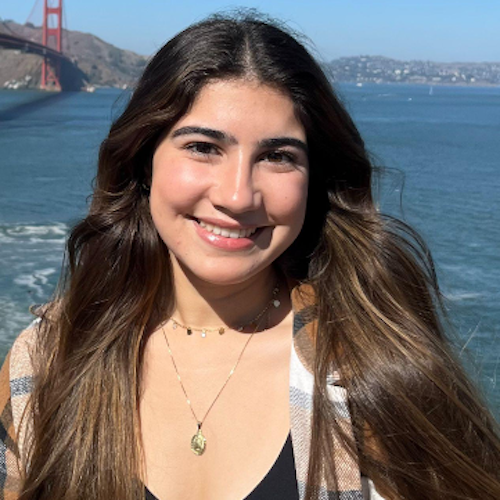
Leticia Cardoso Quieroz, Logistics
Leticia is a sophomore at the University of Notre Dame majoring in Business Analytics and Global Affairs. Hailing from São Paulo, Brazil, she proudly identifies as a first-generation college student. Leticia's passion lies in the exploration of the intersection between technology and quality of life on a large scale. Driven by her dedication to understanding the critical role of global business in reducing poverty and inequality, Leticia actively participates in the South Bend Entrepreneurship and Adversity Program (SBEAP). In this capacity, she engages in social consulting for local entrepreneurs in South Bend, contributing to positive change within the community. Additionally, Leticia is an International Business Scholar, where she engages with a select group of students to explore the ethical and professional dimensions of pursuing business as a force for good on an international scale. Outside of her academic pursuits, Leticia enjoys her free time by traveling, playing dominoes, and hanging out with friends.
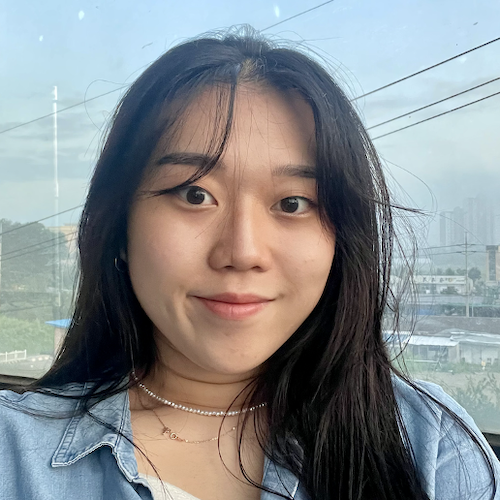
Kristin J. Park, Logistics
I am a first-year University of Notre Dame student studying Global Affairs. I plan to go to law school after my undergraduate studies and find fields in political science and international relations interesting. I am passionate about seeking justice for victims of any form of injustice – as this comes to me as very personal – and I believe this explains my past experiences in trying to understand the justice system in roles ranging from being a scholars’ network ambassador to serving as a volunteer teaching assistant for those with outstanding academic abilities despite their financial challenges. I characterize myself as a futuristic harmonizer, a goal-oriented relator, and a responsible developer.
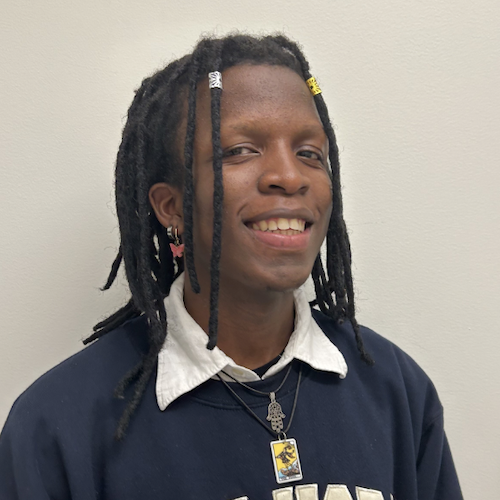
Fabrice Uwihirwe, Logistics
Fabrice is a senior studying Economics and Global Affairs. He is part of the Kellogg International Scholars Program and is currently conducting research with Professor Cordova on effective interventions looking to reduce violence against women. Uwihirwe traveled back to his home country of Rwanda this past summer on a Kellogg/Kroc Undergraduate Research Grant to conduct research on the role parents and teachers play in the retention of students. Education is one of the most important drivers of upward mobility, and Uwihirwe’s project examined effective strategies in keeping students in school so they can reap the long-term benefits of an education. He is particularly interested in research and advocacy on education, housing, and food security for people of color, particularly Black people.
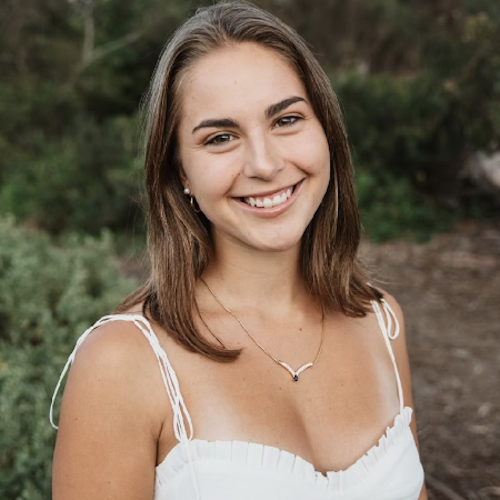
Julianna Forry, Liaisons
Julianna is a sophomore from Santa Barbara, California studying Medical Anthropology and International Development Studies. She is currently a part of the Eck Institute Undergraduate Research Team investigating maternal mortality outcomes in the South Bend community, and is also assisting Professor Joyce Adams with her implementation of the Pop Up Pregnancy Village in St Joseph County. Julianna serves as GHU Coordinator and Advocacy Coordinator on the GlobeMed Board at Notre Dame, which focuses on education about global health crises and outreach with local partners- like the AIDS Assist organization in South Bend. Julianna is passionate about maternal and child healthcare policy, as well as infectious disease biology. Outside of academics, Julianna enjoys playing tennis, indoor cycling, hanging out with friends, dinners with family, and watching documentaries.
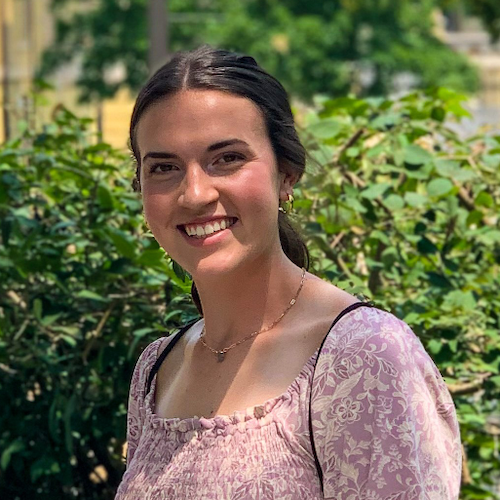
Molly Griffith, Liaisons
Molly is a sophomore from Columbus, Ohio studying Economics and Political Science with a minor in Constitutional Studies. She is a Kellogg International Scholar and assists Professor Susanne Wengle with her research investigating how the 2022 Russian invasion of Ukraine has affected the Ukrainian agricultural sector and the global food system more broadly. On-campus, Molly is also involved with the Notre Dame Journal of Political Science and EuroSecND. She is looking forward to working with the HDC team in planning an engaging and informative conference this spring!
Presenters

Adriana Abinader
Adriana is a senior from Santo Domingo, Dominican Republic studying Psychology and Global Affairs with a concentration in International Development. She grew up witnessing the pervasive challenges of sexism in the Dominican Republic, including how it contributed to issues such as teen pregnancy and heightened levels of violence against women in the country. This led her to choose her research topic on gender-based violence and conduct her project in Mexico City. Adriana has previously worked as a research assistant at the Pulte Institute for SHARE (Supporting Holistic & Actionable Research in Education) and for CARA (Central American Research Alliance) assisting on the Gang Resistance Education and Training (GREAT) program. She is passionate about public policy, education, and women’s empowerment.
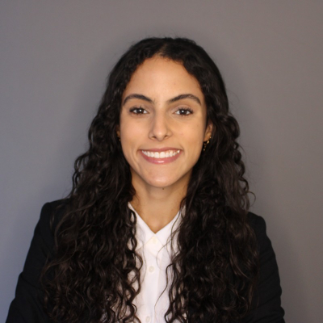
Alessandra Rosa Policarpo
Alessandra is a first-generation college student from Brazil, and is currently pursuing a double major in Economics and Political Science and a minor in Latin American Studies at Macalester College. With a passion for decolonization, entrepreneurship, youth empowerment, and gender equality, she is driven to make a positive impact in the world.
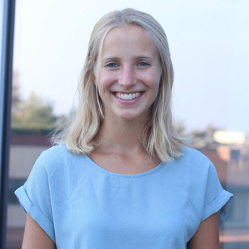
Amelia Opsahl
Amelia is a current Junior at Claremont Mckenna College (CMC). Here, she is majoring in Foreign Languages, which is a program that develops fluency in French, Spanish, and Portuguese. She is also pursuing a minor in Computer Science. In line with her major, she has studied abroad three times in the past two years, and has either studied abroad or worked in France, Portugal, Argentina, and Brazil. Her research comes from her time in Buenos Aires, where she studied Public Health with the School for International Training (SIT). Outside of her classes, she is on the Varsity Cross Country and Track and Field teams, serves as a leader in various student organizations, and works as a tour guide for CMC. She loves spending time outdoors and, of course, traveling, and is honored to be presenting at this year’s Human Development Conference.
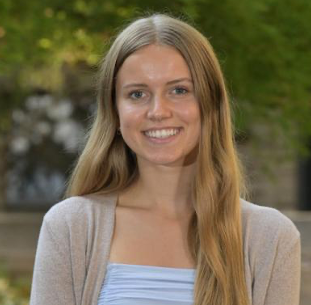
Anna Mittag
Anna is a senior studying Chemical Engineering and Poverty Studies with research interests in sustainability, human rights, and environmental justice. Over the past three years, Mittag has worked with Professor Ellis Adjei Adams of the Keough School of Global Affairs through the Kellogg International Scholars Program. Here, she has assisted on a number of projects regarding environmental impacts in the global south, most recently co-authoring a manuscript on farmer-herder conflicts in sub-Saharan Africa. Additionally, Mittag has participated in lab research regarding water sanitation and filtration, utilizing her chemical engineering education to support her passion for the environment. After graduating in May, Mittag will be working as a sustainability analyst in a sustainability consulting rotational program.
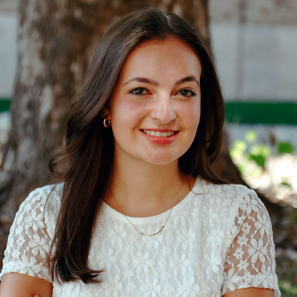
Ashleigh Cotter
Bartell Prize winner
Ashleigh is a senior from New Jersey studying Neuroscience & Behavior. She is interested in health equity and medical anthropology. Cotter received a Kellogg/Kroc Undergraduate Research Grant to complete her International Development Studies capstone project this past summer in Monterrey, Mexico. She interviewed migrant women, healthcare professionals, and social workers about the current maternal healthcare needs and experiences of migrant women. Cotter plans to present her findings at academic conferences and work with stakeholders in Monterrey to address the most pressing needs of migrant women.
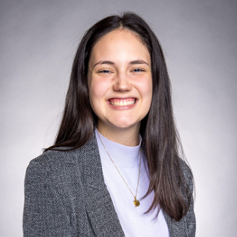
Audrey Feldman
Audrey is a senior Economics and Global Affairs major at the University of Notre Dame. Her research focuses on human capital development, and she has experience in international education, domestic safety net policy, and nonprofit impact evaluations. She is currently working as a research assistant for Dr. TJ D’Agostino on a collaboration with the Boys and Girls Club of St. Joseph County. This project will pilot a randomized controlled trial of a wraparound home visiting service to decrease gun violence and chronic absenteeism. Her independent senior thesis, which she will be presenting at HDC 2023, explores safety net take-up among refugees in the US. Audrey draws inspiration for her work from her hands-on volunteer experiences at a refugee resettlement organization in Syracuse, NY and a mentorship and tutoring program at the local juvenile detention center in South Bend. She is thrilled to present at this conference, and plans on pursuing a research-oriented career that will serve those who have been traditionally excluded from opportunity in this country.
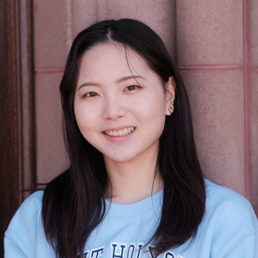
Azuna Sawada
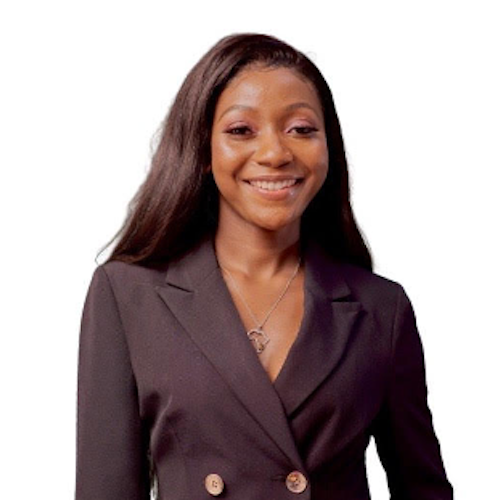
Bupe Lughano Kabaghe
Lughano is a passionate leader committed to African development, governance, gender equality and youth empowerment. Kabaghe is a fourth-year Hesburgh Yusko merit scholar at the University of Notre Dame from Kitwe Zambia. She is pursuing a Bachelor of Arts Degree in Political Science and Global Affairs with a concentration in International Development studies. Kabaghe is an alumnus of the African Leadership Academy(ALA) class of 2020. Kabaghe is the founder of Abana Afrika Foundation a youth-led NGO that empowers Zambian youth in Kitwe through mentorship in personal and professional development, entrepreneurship, and leadership. Lughano and her team have mentored 300 young Zambians in Kitwe through workshops, bootcamps, and community outreach programs in collaboration with government representatives and community organizations.Kabaghe has worked on various research and community development projects that empower girls and promote female and youth political participation in Zambia and abroad. Kabaghe at age 19 worked as the youngest intern at the National Assembly Parliament of Zambia in 2019 and has worked with different organizations in Africa and abroad. such as the 25 May Movement to advance the movement for decolKabaghe is an International scholar at the Kellogg Institute for International Development Studies where she researches Women's Political representation in the Zambian government. Kabaghe worked as a parliamentary aide in the House of Commons in the Palace of Westminster where she worked on policy briefing and political communication. After her studies, she aims to pursue a public service career and join active politics with the aim of running for presidential office.
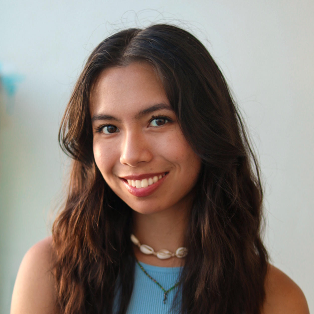
Cora Beeson
Cora is a fourth year at Pacific Lutheran University studying Political Science and Global Studies, with a concentration in Development and Social Justice. During spring semester of 2023, she completed SIT’s Indonesia program, and interned at an interfaith women’s shelter while also carrying out a research project about sexual assault, domestic violence, and abortion within the city of Yogyakarta. This work continues to be important to her and she hopes that this experience can lead her to a future of advocating for the empowerment of marginalized communities. Currently for January 2024, she is studying in Trinidad and Tobago, and interning for the Community Social Services Unit, a section of the Tobago House of Assembly. Cora also has worked as Social Justice director for 2 years within PLU’s student government, and is passionate about language learning. She is able to speak Chinese, and is developing a proficiency in Indonesian and Spanish.
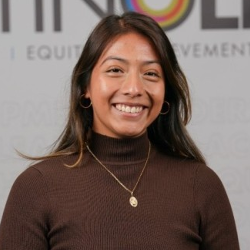
Daisy Alcantar
Daisy is a Senior at Macalester College in Saint Paul, MN. She is majoring in sociology and minoring in political science. Daisy studied abroad in Valparaiso, Chile with SIT during her Junior year. She has a strong interest in social justice, immigration politics, and community development.
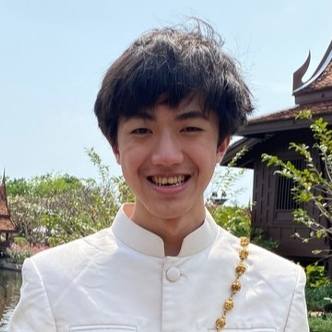
Damien Chang
Damien is an undergraduate at Harvard studying Government. He is interested in international relations, particularly how ideas shape community-building and political reform in other countries.
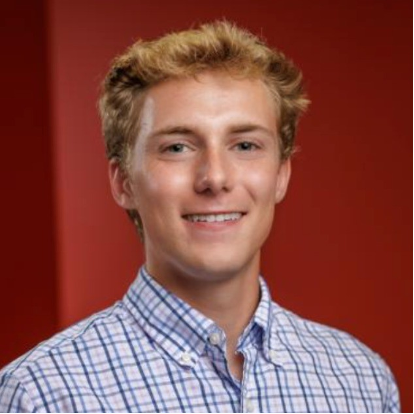
Daniel Mooney
Daniel is a current Sophomore from Red Bank, New Jersey pursuing a double major in international economics and global affairs with a supplementary focus in German language and literature. As a scholar in the Kellogg International Scholars Program, Mooney is assisting Professor Patrizio Piraino in exploring broad determinants of economic disadvantage in developing countries and microeconomic approaches to education and mental health resource development in low to middle-income countries. Mooney's contribution to Professor Piraino's work involves an in-depth investigation into the current state of mental health within low-income, informal settlements in South Africa. Through a microeconomic lens, Mooney is evaluating the most relevant psychological needs throughout the Global South as well as potential methods for psychological intervention within the region.
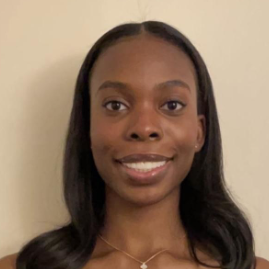
Esther Ekeh
Esther is a senior Psychology major at Gettysburg College. She intends to pursue a career in clinical psychology working with young children. Last Spring, Esther successfully conducted an independent research project in Amman Jordan looking at the different therapy modalities provided to young traumatized refugee children. Beyond presenting her research at the Human Development Conference, she hopes to continue to work with this population to find more effective ways to improve social functionality.

Fabrice Uwihirwe
Fabrice is a senior from Rwanda majoring in Economics and Global Affairs with a minor in Poverty Studies. Uwihirwe traveled back to Rwanda this past summer on a Kellogg/Kroc Undergraduate Research Grant to conduct research on the role parents and teachers play in the retention of students. Education is one of the most important drivers of upward mobility, and Uwihirwe’s project examined effective strategies in keeping students in school so they can reap the long-term benefits of an education. Uwihirwe is interested in studying and combating injustices faced by the African diaspora and other marginalized groups both domestically and internationally.
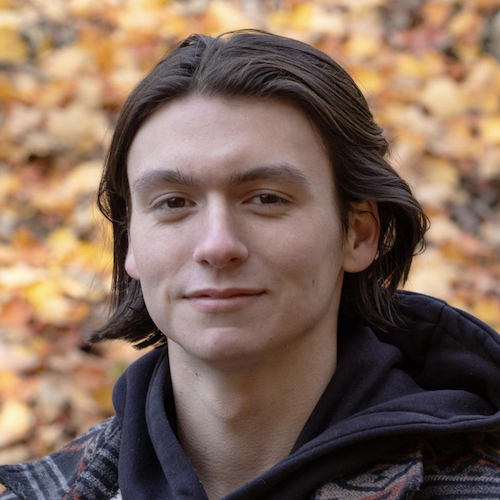
Finn Maechem
Finn is an undergraduate at Macalester College in Saint Paul, Minnesota. He is a double major in Linguistics and Religious Studies. Both of these disciplines informed the research questions and focus of his studies in East and Central Java, and he hopes to continue this work after graduating as a Fellow of Fulbright recipient.
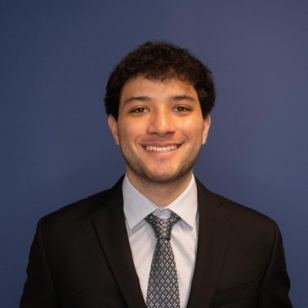
Giancarlo Cappelli Wang
I'm a senior majoring in Political Science and Economics with a minor in International Development Studies. Through the Kellogg Institute, I researched the effects of the COVID-19 pandemic on the effectiveness of innovative literacy policies in northeastern and midwestern Brazil. With the help of faculty advisor Marcio Bahia, my focus is on investigating how the COVID-19 pandemic has created further challenges toward student access to basic public education in underserved communities in Brazil. My research was conducted in municipalities which have shown exceptional resilience and creativity in their public education policies, examining practices which could inform successful policies in other regions in Brazil.Over the past summer, I interviewed teachers, school administrators, and policymakers across three municipalities and two states in order to understand how education professionals have worked towards improving the quality and accessibility of education in their communities.

Grace Clinton
Grace is a senior at the University of Notre Dame studying Pre-Professional Studies, Global Affairs, and Anthropology with a concentration in International Development Studies. Her passion and work surround the furtherance of female health and rights on a global scale. For the past three years she has done research with Dr. Joyce Adams on postpartum maternal health in various parts of Ghana. Her independent research projects work on issues of teen pregnancy in rural districts of Botswana. Grace also works for the Harvard School of Global Surgery and Social Change to help with research and development of international maternal surgical care access and legislation. After graduating in 2024, she plans on attending graduate school for Medical Anthropology with a focus on female and maternal health rights for displaced persons throughout sub-Saharan Africa. In her free time, Grace likes to run, cook, and travel often. She has been a part of the Human Development Conference team since her first-year on campus and is very excited to be a co-chair this year!
Hallee Limes
As a current senior at Ohio Wesleyan, Hallee studies Sociology, Anthropology, and Philosophy.As an avid explorer of global cultures, channels her passion into a purposeful career in anthropology. With an unwavering commitment to understanding the intricacies of diverse societies, she delves into the essence of humanity through her studies. Her academic journey led her to Samoa, where she focused on unraveling the nuances of identity and culture in early childhood—an experience that further fueled her curiosity. Hallee's dedication to fostering cross-cultural understanding reflects not only in her academic pursuits but also in her belief that embracing diversity is essential for a more interconnected world
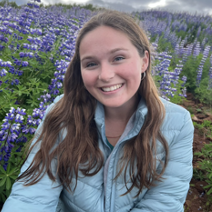
Isabel Powell
Isabel is a fourth-year undergraduate student at Georgetown University studying Biology of Global Health and Justice & Peace Studies. Through her pursuit of sustainable health equity, particularly for refugee or mobile populations, Isabel traveled to Dharamshala, India as part of the SIT India: Public Health, Gender, and Community Action program. There, she investigated the synergistic impact of stigma, migrant community identity, and genetics on patient mental health and healthcare seeking behavior. In addition to her professional pursuits, Isabel spends her time tutoring with A Better Chance, cooking, and exploring the world.
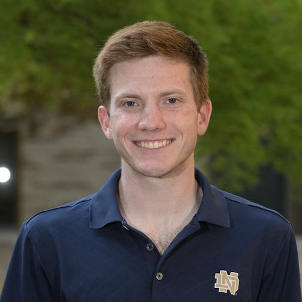
Jack Drey
Jack is a senior at the University of Notre Dame studying Biological Sciences with minors in International Development Studies and Classical Studies Greek and Roman Civilization. Jack is passionate about global health and education and how they can contribute to international development. He currently works with Professor Mark Golitko studying long-term human response to environmental change in northern Papua New Guinea, and in the Blagg Lab, which is part of the Warren Center for Drug Discovery at the University of Notre Dame. Jack’s independent research project took place in Kisumu, Kenya, where he worked with the Rusalia Resource Foundation to study barriers and drivers of girls’ academic success in rural Kenya, and how mentorship can provide effective support to these students. After graduating in 2024, Jack plans to take a gap year before attending medical school. In his freetime, Jack loves to play tennis, read, and travel.

Jessica Ashman
Jessica is a senior at the University of Notre Dame, studying Anthropology and Global Affairs with a concentration in International Development and a minor in Latino Studies. Jessica is passionate about topics having to do with sociocultural identity and its intersections with human development. She strongly believes in the power of social science research to generate informed solutions to complex problems. Jessica’s independent fieldwork took place in the Dominican Republic where she examined concepts of colorism, anti-Haitianism, national identity, and education. Over a two month period, she worked with two development NGOs to conduct interviews with Dominican and Haitian young adults. Currently, she works with Dr. Luis Felipe R. Murillo who conducts research on open technologies in Afro-descendent Brazilian populations. After graduation, Jessica plans to pursue her PhD in Socio-cultural Anthropology so she can continue her lifelong exploration of transnational blackness and the barriers to social inclusion. In her freetime, Jessica likes to sing, spend time with friends, and learn about other cultures.
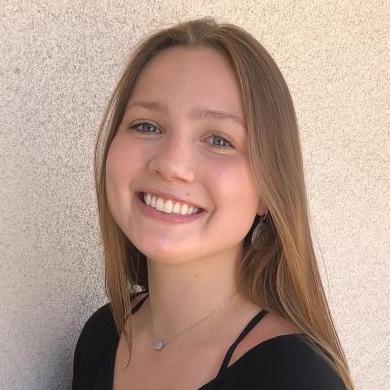
Jillian Brunner
Jillian is a senior at the University of Notre Dame majoring in Neuroscience and Behavior with a Supplemental Major in Spanish and a Minor in Compassionate Care in Medicine. Jillian is interested in global health and healthcare disparities, especially in Latin American countries. The main demographic she wants to learn about is adolescent pregnant women and their children. During the summer of 2022, Jillian received a grant to participate in an Experiencing the World Fellowship through the Kellogg Institute. Jillian spent 4 weeks in La Paz, Bolivia with physicians and patients to learn about the epidemic of adolescent pregnancy and its effect on child development in a resource limited setting. After graduating in May of 2024, she plans to attend medical school to serve this demographic.
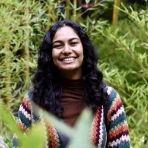
Keerthana Krishnan
Keerthana is from San Jose, California and is a senior at Tulane University. She is studying Public Health and Psychology with a minor in Anthropology. Her future goals include getting an MPH, a PhD in Clinical Psychology, and becoming a practicing Clinical Psychologist. Her presentation at the conference was done during a semester abroad and demonstrates her interest in researching and solving barriers to mental health care.
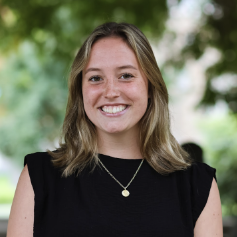
Kerry Conneely
Kerry is a senior studying Environmental Engineering with a minor in International Development Studies. She is passionate about the intersection between climate change, infrastructure, and human development. In the summer of 2023, Conneely conducted field research, using the undergraduate Kellogg/Kroc grant, in coastal communities in Ghana, focusing on the intersection of these interests. Under the advisory of Dr. Ellis Adams, Conneely led interviews with community members and leaders about flooding, sanitation, and wellbeing. On campus, Kerry is the project manager of Notre Dame Students Empowering through Engineering Development (NDSEED), a student-run organization that funds, designs, and constructs pedestrian footbridges in geographically isolated communities in Latin America. This opportunity has allowed her to further combine her interests in engineering and international development. She is also involved in the club swim team and the Society of Women Engineers.
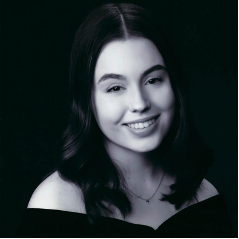
Lauren Carter
Lauren is a student at the University of Richmond completing a double undergraduate major in Psychology and Anthropology. With a burgeoning interest in the cultural dynamics and psychological aspects of high-altitude communities, Lauren's academic journey recently led her to spend a semester abroad in Nepal, specifically in the Himalaya region of Mustang. Her current research, born from this experience, explores the intersection of traditional practices like yak herding with contemporary socio-economic and environmental challenges. As a researcher, Lauren has worked on the Belonging Project, an interdisciplinary initiative funded by the Howard Hughes Medical Institute, focusing on fostering inclusion in STEM at the University of Richmond. Additionally, her experience as a research fellow involved an in-depth analysis of women's social networks and conflicts among the Tsimane people of Bolivia.
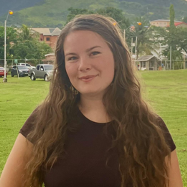
Lena Kennell
Lena is a Political Science major at Wellesley college in her senior year. She is passionate about collaborative problem-solving and the importance of intersectional research that accurately represents the diversity of affected populations .Her work is guided by her fundamental belief that in order to understand and accept each other, you must first see each other. Her research on gendered discrimination and erasure of Samoan queer individuals began when she studied with SIT (School of International Training) in Apia, Samoa. She presented this research at the Wellesley Ruhlman conference. She plans to continue working with the Samoan queer community to better address gendered dimensions of discrimination. In her free time, she enjoys playing ultimate frisbee, making ceramics, and spending time outside.
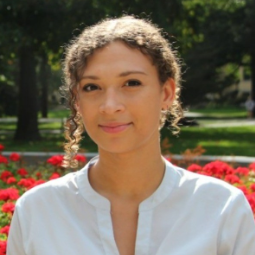
Lena Shadow
Lena is a fourth-year sociology student at the University of Notre Dame with minors in international development studies and data science. Her passion lies in promoting women's empowerment as a strategy for economic and social development with a geographical focus on sub-Saharan Africa. On campus, Lena is employed with the Center for the Study of Languages and Cultures and served as the co-lead for multiple global development policy projects through ND's Student Policy Network. She hopes to continue her work through an eventual career in development program monitoring and evaluation.
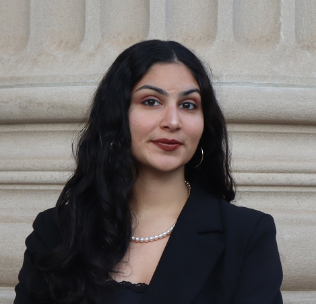
Laiqa Walli
Laiqa aspires to sustainably influence East African development with more informed and culturally appropriate policies. Laiqa grew up in Tanzania and went to a boarding school in Kenya. She is a fourth-year Yale undergraduate, majoring in Global Affairs and African Studies, alongside a Statistics & Data Science certificate. Laiqa aspires to reshape politics using data analytics to address government structuring, resource allocation, and education policy. Her commitment stems from a desire to combat modern colonialism and corruption, ensuring equitable development. In 2019, she delivered a TedTalk, "Developing Africa Not Westernizing it," advocating for local research and adapted policies to decolonize and empower Africa. Laiqa is a fellow for the MacMillian Center ‘Through the Eyes of She Initiative’ that focuses on gender equity in Africa. She is also the Deputy Director for Yale Africa Innovation Symposium, a space created for youth to create actionable solutions across African industries.
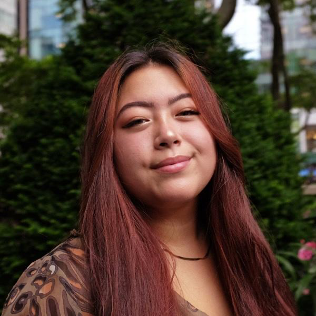
Lillie Kang
Bartell Prize winner
Lillie is a 4th year student at Washington University in St. Louis with a major in International Studies: Development and a minor in Global Health. Her research interests include capacity building, rural health access, systems thinking, and transformative health justice. Currently, Lillie works as a development project manager at Welcome to Chinatown, a nonprofit operating in NYC Chinatown small business support and cultural preservation. Past job experiences include refugee resettlement services, educational justice in urban spaces, and immigration policy research assistantship. In spring 2023, Lillie had the opportunity to study in Nepal, through the lens of development, gender and social change in the Himalaya. After graduation, Lillie plans to attend Brown School of Social Work at WashU in St. Louis to pursue a Masters in Public Health, specializing in global health. Outside of academics, she enjoys playing flute competitively, singing karaoke, and watching food documentaries.

Lucy Wesson
Originally from Colorado, Lucy Wesson is a senior at the University of Oregon Clark's Honors College, pursuing a Bachelor of Arts in Global Studies with a concentration in Peace Studies and triple minors in Spanish, Linguistics, and Textile Arts. She has lived, studied, and conducted research in both Croatia and Rwanda for over three months. Lucy is passionate about understanding women’s experiences during conflict and development. Her research focuses on various participatory and creative solutions that encourage women’s empowerment and liberation. In her early professional career, she has worked in the nonprofit sector as a legislative intern, conducting policy research and advocating for students' rights. Additionally, she serves as a development coordinator, promoting sustainable tools for women’s development and climate security in Senegal.
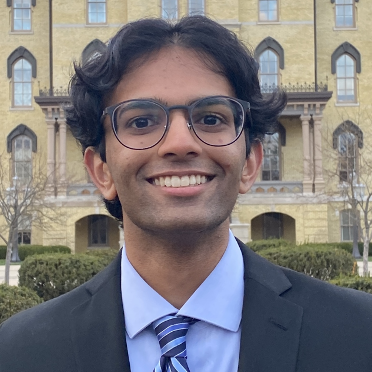
Manvit Adusumilli
Manvit is a senior at Notre Dame studying Neuroscience & Behavior and Global Affairs. He has participated in summer opportunities in service and health through the Center for Social Concerns, in addition to volunteering and conducting research throughout the school year. This past summer, Manvit conducted independent research with Partners in Health in rural Mexico through the Kellogg Institute. In the future, Manvit hopes to become a physician and continue working on projects related to community and public health.
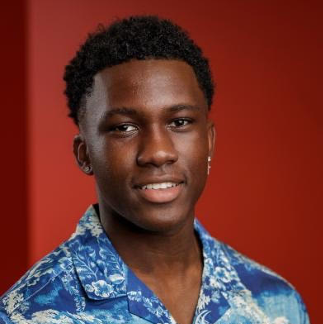
Oluwatoni Akintola
Oluwatoni is a Sophomore at the University of Notre Dame majoring in Computer Science & Economics. He is currently working on a project that examines whether a management intervention targeting school leaders can offer a cost-efficient method of improving public service delivery in schools in Uganda. Outside of research, Akintola enjoys reading, writing poetry, and watching films.
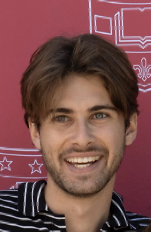
Peter Cohen
Peter is a senior at Washington University in St. Louis studying Educational Studies, Psychology, and Creative Writing.
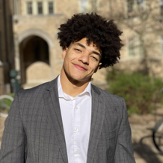
Robert Fitzpatrick
Robert is a senior at the University of Notre Dame studying Sociology with minors in International Development Studies and Latino Studies. Over a period of 11 weeks, he conducted independent field research in Costa Rica. He set out to examine how Afro-descendant and Indigenous Costa Ricans benefit from sustainable agriculture using interviews, ethnographic observation, and archival review. Robert has also spent time working under Dr. Kraig Beyerlein and studying under Dr. Rory McVeigh in the Sociology department. He has worked on environmentally-focused projects in Latin America and the U.S. During college he learned to speak Spanish fluently and has begun learning Haitian Creole and Italian. After graduation Robert will serve communities through the Peace Corps before returning for graduate school to study Global Affairs. He believes that research is key to building environmental and racial justice, especially by uplifting marginalized voices.
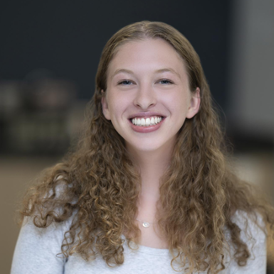
Sally Fales
Sally is a Washington University senior double majoring in Educational Studies and Sociology, with a minor in African and African American Studies. She conducted research in the semi-rural township of Cato Manor in Durban, South Africa, in the spring of 2023. Her academic and research interests include historical and present-day access to educational resources and opportunities, literacy acquisition and benefits, and transformative teaching methods in K-12 urban school classrooms. Sally has entered schools and nonprofits in Newark, Memphis, and St. Louis to learn the challenges and successes in underserved communities while teaching literacy-based curricula. She is thrilled to continue her education this fall, pursuing a Master's in Education and teaching certification at Harvard's Graduate School of Education.
Samantha Murphy
Samantha is a senior at Occidental College majoring in Sociology and double minoring in Critical Theory & Social Justice and Media Arts & Culture. During the fall of 2022, she completed a study abroad program with the School for International Training focused on Culture, Social Change, and Development. Here, she completed a one-month independent study project on Ho Chi Minh City’s sex industry. Since then, she received funding to conduct research on implicit biases in American Public Media’s Marketplace radio show, which she is currently working on as her senior comprehensive research project. She hopes to continue conducting research both domestically and internationally
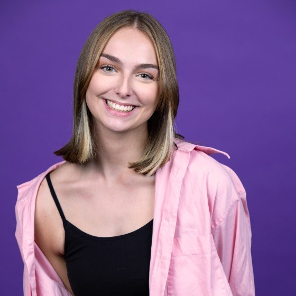
Samantha Wheelis
Samantha, a senior film major and environmental studies minor at Temple University, is a dedicated documentary filmmaker with a passion for translating impactful research into visual narratives. Her goal is to make research more easily accessible by displaying it in different mediums. One of her main interests is understanding the intersectionality of people and the environment and how we can foster a sustainable future for the world. Samantha studied abroad with SIT in Samoa, exploring the importance of fishing in Samoan culture and its connection to environmental health. This led her to discover her passion for not only filmmaking but environmental based research as well. In the future, she wants to further study environmental sustainability and justice, and continue making compelling documentaries on current issues.
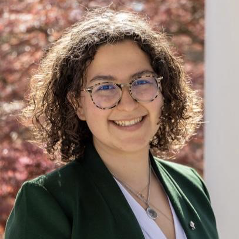
Sezin Sakmar
Sezin is a fourth-year undergraduate student at The George Washington University studying Anthropology and Public Health. While studying abroad in India during the Spring 2023 semester, she had the privilege of conducting an independent qualitative study with the Comprehensive Rural Health Project (CRHP) – an internationally recognised organization seeking to utilize healthcare as a means to break the cycle of poverty. Here, she shadowed various healthcare providers working to implement family planning initiatives in rural Maharashtra through empowerment-driven community paramedicine efforts. Sezin intends to return to India upon graduation, continuing to learn from the stellar Village Health Workers, Mobile Health Team, and physicians at CRHP so that she may embody their values and mindset as an OB-GYN after attending medical school. In her free time, Sezin can be found volunteering as an EMT on GWU’s student-run collegiate EMS agency, spending time with loved ones, and doing tarot readings!
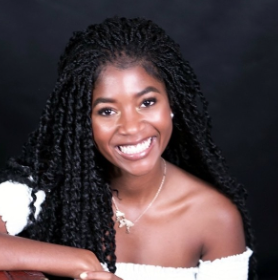
Simone Watson
Simone is a Graduating Senior at Spelman College in Atlanta, Georgia. She is a double major in Spanish and International Studies with a concentration in Cultural Studies. In 2023, she completed two large research projects, an ethnographic independent study project during her semester abroad in Chile as well as a cultural/media analysis project for her institution. Her preferred area of research is Cultural Studies with a particular focus on the intersection between Postcolonial/Decolonial Theory and Race Theory. She particularly enjoys the study of popular culture and media production through these academic lenses. Simone plans to continue to produce work that prioritizes the analysis of our ever-changing media landscape in both English and Spanish after receiving her Bachelor’s Degree.
Bartell Prize
The Rev. Ernest J. Bartell, CSC, Prize for Undergraduate Research on Poverty and Development is conferred annually at the University of Notre Dame's Human Development Conference. Two $1,000 prizes recognize outstanding undergraduate student research on poverty and development. Each year one prize will be given to a student at the University of Notre Dame and one to a student from another university.
Undergraduate students invited to present at the 2024 Human Development Conference are eligible to apply for this award. Information regarding how to apply is included in the conference invitation. Students who wish to be considered must apply by Monday, January 15, 2024. Additional information and/or an interview may be required. Finalists will be notified in the beginning of February.
Student research should address a specific aspect of poverty and development, whether in the United States or abroad. Research may be submitted from any field of study, including the social sciences, natural sciences, and humanities. Students are encouraged to conduct original research and to consider programs and policies that could help reduce poverty. A faculty committee will determine the award recipients, and prizes will be conferred during the Human Development Conference, February 23-24, 2024.
Call for Papers
The Ford Program in Human Development Studies and Solidarity and the Kellogg Institute for International Studies, part of the Keough School of Global Affairs at the University of Notre Dame, announce the 16th annual Human Development Conference.
For sixteen years, the Human Development Conference has provided a forum for undergraduate students from a wide range of backgrounds and disciplines who are passionate about development to engage in dialogue about development research.
The 2024 Human Development Conference, themed Power of the People: Uplifting Global Communities. This year’s conference seeks to highlight the importance of localization and ownership agendas within the development sphere. Bountiful agency has always existed within all communities. Our theme emphasizes the idea of practitioners and researchers working to collaborate with communities as opposed to working for communities.
We welcome and invite all undergraduate students to share their research experiences from a broad spectrum of topics in human development, including but not limited to:
|
|
|
Undergraduate students interested in presenting should submit a max 350-word abstract of their research projects: click here. The final submission deadline has been extended to Monday, November 13, at 11:59 PM.
In line with this year’s theme of global communities, there will be both in-person and virtual presentation opportunities, as well as panels conducted in English, French and Spanish, to increase conference accessibility and include the many perspectives that deserve a place in important conversations of human development.
Invitations for participation will be extended in early December. Selected presenters will also be eligible for the Rev. Ernest J. Bartell, CSC, Prize for Undergraduate Research on Poverty and Development, a $1,000 award conferred to two outstanding undergraduate researchers presenting at the Human Development Conference. (see tab)
We hope that you will join us in participating in this important conversation!
Deadline Extended: Monday, November 13, 2023
Presentation Guidelines
Presenters are expected to attend the entirety of the conference, from Friday afternoon to Saturday evening. Due to the number of presenters involved in the conference, we are unable to meet requests for specific presentation times. Please plan your travel accordingly.
Panel Presenters will be placed with 1-3 other students whose research is related. A panel will last for 1 hour and 30 minutes and consist of student presentations, feedback from a faculty moderator, and discussion & questions with the audience. Please be aware that going over time may infringe upon the time allotments of other presenters.
Length: 15 minutes
Format: Presenters typically utilize a PowerPoint, Google Slides, etc. to present their project. We encourage creativity with graphs, charts, videos, etc.
A desktop, projector, screen, and podium will be available in each of the session rooms. You will not be able to use your own laptop for your presentation.
What to include in your presentation:
- Brief introduction of research and relevance
- Methodology
- Discussion of results and conclusion (this should be the bulk of the presentation)
- Relate your research to the conference theme.
Please email your final presentation to hdc@nd.edu by Monday, February 19, to provide panel moderators with adequate time to review and prepare their remarks and feedback. Following the conference, your presentation may be placed on our website to serve as a guideline for next year’s presenters.
Accommodations
Local Hotels
A list of local hotels that previous conference presenters have stayed at (please note travel time to campus from each hotel differs):
Embassy Suites
1140 E Angela Blvd
South Bend, IN 46617
(855) 213-6794
The Fairfield Inn and Suites
1220 East Angela Boulevard
South Bend, IN 46637
(574) 234-5510
Inn at Saint Mary's
53993 US 933
South Bend, Indiana 46637
574-232-4000
The Morris Inn
1399 Notre Dame Avenue
Notre Dame, Indiana 46556
(574) 631-2000
Toll free (800) 280-7256
Helpful Information for Travel to South Bend
The majority of the conference will be held at the Hesburgh Center for International Studies at the University of Notre Dame, located in Notre Dame, Indiana. (Note: This is not to be confused with the Hesburgh Library, which is also located on the Notre Dame campus. You can distinguish the two by noting that the library is 13 stories tall, while the Hesburgh Center is not).
Please note that the University of Notre Dame is in the Eastern Time Zone.
Notre Dame, Indiana, is 90 miles east of Chicago. The surrounding communities are South Bend and Mishawaka.
Car Travel
From the north, east, or west (ex. Chicago)
The University is located South of the Indiana Toll Road (Interstate 80/90).
- Take exit 77 toward IN-933/US-31/South Bend/Notre Dame from I-80/90 E.
- Turn right onto Indiana 933 South/South Dixie Way. Proceed 1.1 miles.
- Turn left at the 4th stoplight onto Angela Boulevard. Proceed 0.8 miles.
- Turn left at the 1st stoplight onto Notre Dame Avenue.
- Turn right at the 1st stop sign onto Holy Cross Drive.
- Signs will identify visitor parking.

From the south (ex. Indianapolis)
- Take US 31 North. It becomes Indiana 933/US 31/Michigan Street just south of South Bend.
- Proceed on Indiana 933/US 31/North to Angela Boulevard, which is the second stop light north of the St. Joseph River.
- Turn left at the 1st stoplight onto Notre Dame Avenue.
- Turn right at the 1st stop sign onto Holy Cross Drive.
- Signs will identify visitor parking.
Air Travel
Flying into the South Bend Regional Airport: Arriving at the South Bend Regional Airport can be a convenient way to travel to Notre Dame. Airlines serving South Bend include Allegiant, Delta, and United Airlines.
Cab fare from the South Bend Regional Airport is approximately $15. There are typically cabs waiting outside the airport. A list of South Bend Regional Airport approved cab services is available on the airport website at http://flysbn.com/transportation/taxi-train-bus/
Flying into Chicago Airports: Flying into Chicago O'Hare or Midway Airport can be a cheaper way to travel to Notre Dame. Train transportation is available from Chicago to the South Bend Regional Airport via the South Shore Line.
Train Travel
From Chicago O’Hare to Millennium Station
Follow the signs in the airport for trains to the city. In the train area, follow the flashing yellow light to find the train that is loading passengers. Take the Blue Line towards the Forest Park Terminal to Washington station. From that stop, walk one block north on Dearborn Street and 3 blocks east on Randolph Street to arrive at Millennium Station, where you can board the South Shore Line to the South Bend airport.
On the way back to Chicago O’Hare, take the South Shore Line to Chicago’s Millennium Station. Walk 3 blocks west along Randolph Street to Dearborn Street. Turn left on Dearborn Street and proceed to the Washington subway station for the Blue Line. Follow overhead signs towards Chicago O'Hare. Ride the train to the O'Hare Station, which is at the end of the line. The train ride to O’Hare takes approximately 40 minutes and runs every 5–10 minutes depending on the time of day.
From Chicago Midway to Millennium Station
Follow the signs in the airport for trains to the city. Board the Orange Line and take it to the Randolph/Wabash station. Walk 1 block east on Randolph Street to arrive at Millennium Station, where you will board the South Shore Line to the South Bend airport.
On the way back to Chicago Midway, take the South Shore Line to Chicago’s Millennium Station at Randolph Street. Walk 1 block west along Randolph Street to Wabash Avenue and enter the Randolph/Wabash station for the Orange Line. Follow signs and take the train marked with orange signs to Midway Airport. Ride to the Midway Station, which is at the end of the line. The train ride to Midway takes about 30 minutes and runs every 5–10 minutes depending on the time of day. Follow the signs and take the overhead passage to the airport terminal, about one-quarter mile.

From Chicago’s Millennium Station to the South Bend Regional Airport
The South Shore Line commuter train travels from downtown Chicago to the South Bend Regional Airport. One-way fare is $14.25. The train takes about three hours to travel from Millennium Station to South Bend, but keep in mind the one-hour time change between South Bend and Chicago. Additional information is available at https://www.mysouthshoreline.com/. To arrive at the downtown terminal of the South Shore Line in Chicago (Millennium Station), take the Blue Line train from O’Hare Airport or the Orange Line train from Midway Airport (see above).
From Cities across the Country
Amtrak runs directly to South Bend. After arriving at the station, you would then need to call a taxi or uber to take you to the Notre Dame campus. Please refer to www.amtrak.com for schedules.
Bus Travel
From Cities across the Country: Greyhound stops at South Bend Regional Airport. Schedules and stations are available at www.greyhound.com.
Past Conferences
2023
Solidarity in Development: Empowering Agents of Change
February 24 to 25, 2023
This year’s conference theme, Solidarity in Development: Empowering Agents of Change, seeks to highlight the positive impacts individuals, organizations, and communities can have addressing the many global challenges of today's world. Pragmatic solidarity leads to action, engagement, and accompaniment beyond the traditional notion of solidarity as an attitude. Accompaniment provides an opportunity for the mutual exchange of knowledge and experience among development actors. This collaboration between all agents of change can bring about inclusive and sustainable development outcomes for a world facing innumerable issues, from a pandemic and climate crisis to international conflict and food insecurity.
2022
Our Global Responsibility: Seeking Inclusive Growth Amidst Widening Inequality
February 25 to 26, 2022
Throughout the past year, the world witnessed widening gaps of inequality in all aspects of our society due to the COVID-19 pandemic. Even today, the pandemic continues to further inequality at all levels — including education, poverty, and public health — disproportionately affecting vulnerable populations. Building off of last year’s conference theme, The Future is Now: Innovative Responses to Global Adversity, the 2022 conference seeks to shed light on the continued need for interdisciplinary innovation and our responsibility as global citizens for collaboration during these times of widespread disparity.
2021
The Future is Now: Innovative Responses to Global Adversity
February 26-27, 2021
Global development and collaboration cannot be halted due to COVID-19 or any other global adversity. The ways we approach integral human development must be adaptable to our ever-changing global environment. Oftentimes, new solutions are driven by unavoidable barriers and unexpected set-backs, and impressive innovations arise from times of crisis. In the midst of the COVID-19 pandemic, creative adaptability is key to persevering in the mission of integral human development, which is to foster conditions conducive to flourishing for every individual and every community. So far, we have seen a contagious energy as new methods of communication and collaboration inspire hope for the achievement of this mission. In a time with added fear and uncertainty, social connectedness is truly the only way forward. From the bottom up, integral human development must be fueled by a commitment to social connectedness through inclusive discourse and collaborative innovation.
2020
Development on the Move: Global Strategies Informed by Local Contexts
February 21-22, 2020
Development on the Move not only addresses the need to understand and address issues from a global perspective but also calls each of us to action. This conference will emphasize shifts in both personal and collective action, focus on developing expertise in global issues, and spark conversations that lead to change.
2019
Engaging with Empathy: A Preferential Option for the Poor in Development
February 22-23, 2019
In order to ensure that past historic injustices are not repeated and to promote the human dignity of all individuals, it is necessary to engage with empathy and to view research, problems, and policies from the perspective of those most affected by development challenges.
2018
Decades of Development: Contextualizing the Past, Envisioning the Future
February 23-24, 2018
Human-centered approaches to development requires trust, compassion, and awareness in order to place the individual at the center of development.
2017
Development with Dignity: A Human-Centered Approach to Progress
February 24–25, 2017
In order to implement the Sustainable Development Goals, the global community needs to shift from theory to practice – from policy to individuals – refocusing its efforts by placing humans at the center of the sustainable development agenda. Creating solutions to critical issues that afflict the world’s populations today requires not only a shift in scale but the recognition and continual affirmation that the dignity of peoples on all sides of the path to progress must be the central focus of development.
2016
Re-Imagining Development: Pursuing Good in a Changing World
February 26–27, 2016
The conference focused on the transformative power of new ideas: how development paradigms that emphasize agency, inclusivity, and dignity can redefine success and challenge traditional methods in development. As the new Sustainable Development Goals illustrated, this evolution in development calls upon countries and citizens in both the developing and developed worlds to work together to overcome our shared challenges and ensure our interconnected prosperity.
2015
Envision, Enact, Evaluate: Sustaining Momentum in Development
February 27-28, 2015
2014
Transforming Development: New Actors, Innovative Technologies & Emerging Trends
February 28 – March 1, 2014
The theme of the sixth annual Human Development Conference, "Transforming Development: New Actors, Innovative Technologies & Emerging Trends," was inspired by the idea that development is an evolving process. A widening set of stakeholders and rapidly advancing technologies raise new possibilities for the field. The conference was a chance to reflect on both successes and failures in development, while analyzing opportunities created by these new trends.
2013
In the Field: Cultivating Collaboration and Innovation
February 8-9, 2013
The fifth annual Human Development Conference, “In the Field: Cultivating Collaboration and Innovation,” brought together more than 200 students, faculty members, and development experts from around the world, including keynote address speaker, Sara Sievers, the founding executive director of the Center for Globalization and Development at Columbia University’s Earth Institute. Over 70 students presented their own research, representing fieldwork from more than 30 countries. Topics addressed ranged from evaluating the perceptions of trust among Peruvian sexually abused victims to combating cancer in Samoa and implementing organic agricultural certification in India.
2012
Faces Behind the Figures: Visions of Prosperity, Progress, and Human Potential
February 10-11, 2012
The fourth annual HDC, “Faces Behind the Figures: Visions of Prosperity, Progress and Human Potential,” took place during February 2012, culminating in a keynote address given by Not For Sale’s co-founder and executive director Mark Wexler. The conference featured 250 students, faculty and development experts from across the United States and beyond. Eighty-two students presented research on development-related topics conducted in over 35 different countries. Panels addressed topics ranging from food security and agricultural development to post-conflict transformation and the effectiveness of foreign aid.
2011
Unleashing Human Potential: Global Citizens in Pursuit of the Common Good
February 11-12, 2011
The third annual Human Development Conference, “Unleashing Human Potential: Global Citizens in Pursuit of the Common Good,” brought together 73 undergraduate and graduate student-presenters with research experiences in over 30 countries. The Ford Program also welcomed a group of two students and three faculty members from Uganda Martyrs University, the program’s partner university in on-site research and development projects. The two-day conference concluded with a dinner banquet and keynote address given by microfinance specialist David Roodman from the Center for Global Development.
2010
People, Power, and Pragmatism: The Future of Development in Our Changing World
February 26-27, 2010
The second annual Human Development Conference, “People, Power, and Pragmatism: The Future of Development in Our Changing World,” was held in February of 2010. More than doubling in size from the previous year, the conference grew to 80 students with research experiences in 38 different countries. Thirty-eight colleges and universities from across the globe were represented. Ray Chambers, the United Nations Secretary-General’s Special Envoy for Malaria, spoke on his commitment to the Millennium Promise and Malaria No More. The keynote address was delivered by Joseph Sebarenzi, the former speaker of the Rwandan Parliament, who spoke passionately about his experience as a genocide survivor and his efforts to create reconciliation, peace and development in Rwanda and the world.
2008
Innovation in the Service of Human Dignity: A Human Development Conference
November 7-8, 2008
In November of 2008, the symposium grew into a full conference sponsored by the Ford program and co-sponsored by the Center for Social Concerns and the School for International Training. The program's first annual undergraduate research conference, “Innovation in the Service of Human Dignity” featured graduate and undergraduate student presenters from 29 universities and representing 28 countries of research. The conference drew more than 250 participants, and moderators from around the country also attended the conference to facilitate panel discussions. Peter McPherson, the former head of USAID, delivered the keynote address.
Solidarity in Pursuit of Authentic Human Development
Saturday, February 23, 2008
In 2008, together with the Center for Social Concerns, the Ford Program sponsored a student research symposium entitled “Solidarity in Pursuit of Authentic Human Development.” Twenty-eight students presented at the event, including students from Uganda Martyrs University. Raymond Offenheiser, president of Oxfam America, delivered the keynote address.






